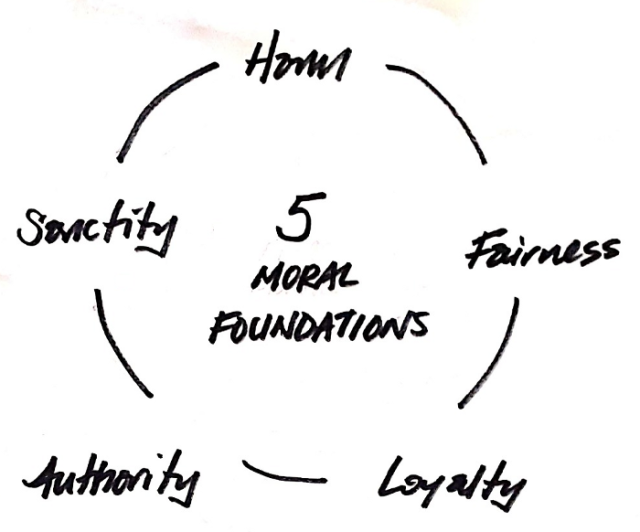
Where Does Morality Comes From?
Where do you think does morality comes from? Do you believe that all of our ideas of right and wrong or good and bad are only taught to us by the society and by the dominant ideology that maintains them? In understanding and assessing the human capacities and tendencies in relation to our cognitive abilities, capacities, and normal psychological functioning, and for salvaging our fate as nature-dependent organism, these questions are very important as they could provide answers to some of our dilemmas as species and fix most of our ecological problems. Therefore, it is valid to ask – is their really a thing called free will? And most importantly, since we asked this question, what if not? What if there is a universal basis for what’s good and what is bad to us as humans or individuals?
Upon evaluating the social condition, why morality is a very important issue? Given that how we see the world reflects what kind of knowledge and education we have on our thinking, accumulated through years of experiential learning, how should we make decisions that doesn’t harm others, the environment and other sentient lives in general? Lastly, why do we have to decide or choose which is good and which is bad for us? Seeing the realities beyond our physical experiences helps us maintain the healthy existence as opposed to the misguided, chaotic, and most of the time regressive tendencies. Having a moral compass helps us navigate the ocean safely and quite accurately; supporting our foundations for us to become a stronger structures as we separate the important ones from the useless.
So now, what is the “Moral Foundations Theory?”
Created by social and cultural psychologists, the Moral Foundations Theory aims to explore the varying forms, similarities, and the recurring themes of the morality that can be found in many different cultures across the globe and attempts to provide a connection between these cultural ethical nature and sources of morality. These foundations are composed mainly of five major reasons or motivations. According to Jonathan Haidt, a former professor and a social psychologist at New York University’s Stern School of Business, there are five different moral foundations of human species. These are care, fairness, loyalty, authority, and sanctity. To elaborate what these really means, let’s discuss it one by one according to Jonathan Haidt’s explanations.
Care…
This value drives us to protect others, especially members of our family or tribe, or the ones that are closed to us or whom we have intimate connections with. This can also be noticeable through the way some people protect animals by being a vegan activist, for example. And, what is more interesting is that animals have this instinct to, even towards beings that are not of their own kind. Therefore, this strongly suggests that to care for other people or other beings is an innate temperament for us creatures of this earth. As a result of our very long history of evolution as mammals, with ability and capacity for emotions such as attachment, pain, disgust, etc.
Fairness…
Most of us people possess the value of being just to others; adapting and maintaining justice for the good of all as opposed to dishonesty. As a product of altruism, this allows us to see the vitality of freedom, justice, and rights.
Loyalty…
All of us are loyal to some point on some things in our lives. According to the theory, regardless of your political compass, it is mostly that you side with your family, tribe or group, circle of friends, and even fellow countrymen. As part of our history as tribes, we have developed this sense of self-sacrifice and allegiance to the group.
Authority…
As people, we have a natural inclination for respect to others, especially to those we look up to as authorities of certain things or ideas that we agree with. Whether you are leftist or a rightist, at least you have biased perspectives towards some social or political issues. And, the authors of the books that you subscribed to are somehow the authorities, whether you accept it or not, that gives you suggestions and ideas on how to live your life in a society. As a product of our very long history of hierarchal structure as a society, respect and trust to genuine authorities ensures social stability and growth.
Lastly, sanctity…
As humans, we naturally detest awkward or disgusting things. This could be anything… our food, words, thoughts, actions, etc. We have this sense of purity within us that we don’t want to commit mistakes and we don’t want to feel uncomfortable or we don’t want to experience negative things. This also drives us to live with pride for higher moral value and standards.
Well, for some people, they cannot accept that this is reality; that we are not completely free and that we cannot be completely free. However, most of them cannot see that the idea of total freedom is a very dangerous concept as to some, this could mean no accountability or responsibility whatsoever. For a society that is biologically hardwired through cooperation and cohesion, it should be obvious that responsibility is an indispensable part of its mechanism. For centuries, scientists and philosophers have thought about this problem – the question of free will. Although it is totally normal and uplifting to believe the reality of free will, physics and religious doctrine suggest the impossibility. However, this doesn’t mean we should not act free; that we cannot be free in this virtually mentally-captured society.
References: https://moralfoundations.org
Featured Photo: https://medium.com/the-polymath-project/moral-foundation-theory-bc2a89f37e4





